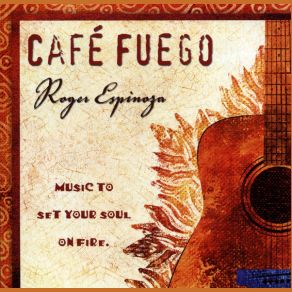Café Fuego / Cafe Fuego
Download links and information about Café Fuego / Cafe Fuego by Roger Espinoza. This album was released in 2002 and it belongs to New Age, World Music, Latin genres. It contains 12 tracks with total duration of 50:17 minutes.

|
|
|---|---|
| Artist: | Roger Espinoza |
| Release date: | 2002 |
| Genre: | New Age, World Music, Latin |
| Tracks: | 12 |
| Duration: | 50:17 |
| Buy it NOW at: | |
| Buy on iTunes $9.99 | |
| Buy on iTunes $9.99 | |
Tracks
[Edit]| No. | Title | Length |
|---|---|---|
| 1. | Day In Alhambra | 4:22 |
| 2. | Cabana | 3:41 |
| 3. | Amigos | 4:21 |
| 4. | Monteverde | 6:11 |
| 5. | Sacred Mountain | 3:53 |
| 6. | Gypsy | 3:56 |
| 7. | Espimel’s Journey | 3:50 |
| 8. | Ibiza Sol | 4:09 |
| 9. | One Love | 4:49 |
| 10. | Goodbye (Pops) | 3:05 |
| 11. | Dimelo | 4:27 |
| 12. | Granada Tropical | 3:33 |
Details
[Edit]Roger Espinoza's Café Fuego is a good example of what could be called "flamenco light" — in other words, modern flamenco-minded acoustic guitar playing that tends to be light (although not lightweight), relaxed, and pop-influenced. This 2002 release is hardly the work of a flamenco purist; Café Fuego is closer to Ottmar Liebert than Paco de Lucia or Tomatito. But not everyone who plays acoustic Spanish guitar is obligated to be another Tomatito, and even though Café Fuego isn't a masterpiece, it is enjoyable and fairly creative. Spanish flamenco isn't Espinoza's only influence; although the Los Angeles-based, Nicaraguan-born guitarist is very flamenco-minded, he isn't afraid to incorporate Afro-Cuban and South American elements. Spain has had a major impact on his playing, but Espinoza is also well aware of what acoustic guitarists have done in Cuba, Brazil, Peru, and Bolivia. Most of the CD is devoted to instrumentals along the lines of Liebert and Strunz & Farah, but Espinoza detours into Gipsy Kings-like vocals on "Gypsy" and "Dimelo." Many flamenco purists have no use for the Gipsy Kings, who they consider pseudo-flamenco — a bastardized pop version of the real thing. In fact, trying to sell a flamenco purist on the Gipsy Kings is like trying to get a bop snob to listen to Grover Washington, Jr.; however, the late saxman was quite creative in his own way, and similarly, a flamenco-pop artist like Espinoza has his place. Anyone who expects Café Fuego to sound like a Paco de Lucia performance is bound to be disappointed, but those who appreciate the album for what it is — a commercial Spanish/Latin American/pop hybrid — will find Espinoza to be pleasant and likable.